The Interior Read online
Page 32
“Phillips, MacKenzie had an innovative program,” David explained to Randall. “Almost as soon as Nixon—President Nixon—opened China, the firm started hiring one or two Chinese law students who were studying in the States each year as summer clerks or even as associates. As you can see, the program had long-term benefits. People like Nixon here returned to China and have risen to positions of power.”
“Not anymore,” Nixon said with feigned indignation. “Now that you’ve come, you’ll put the rest of us Chinese attorneys out of business.”
“I doubt that.”
“Really? Look what’s happened to my business for Tartan. You don’t know this, Mr. Craig, but I’ve done a lot of work for your company. Until now Miles always sent me your China matters, but no longer. Now he has a ‘big gun’ in Attorney Stark.”
“Don’t believe everything you hear,” David warned Randall. “Attorney Chen is one of the highest-paid lawyers in all of China.” Then to Nixon he added, “I recall you said that you bill like New York lawyers.”
Nixon patted his ample waist. “Beijing is the third most expensive city in the world. I have to take care of myself and my hundred employees. We want to live the high life! Given that, I should bill even more than I do.”
Randall Craig seemed to lose interest in the small talk and edged back to his chair, which stood directly across the room from Sun. This south wall was home to the Tartan entourage. Since Doug Knight would be staying with Tartan after the sale, he too was on this wall, seated to Randall’s left. To Randall’s right was Miles Stout. David caught his eye. The senior partner gave a subtle nod to the two chairs next to him. Hulan and David crossed the room and sat down. They had been placed on a wall of equal importance to Sun and firmly in the Tartan camp.
It was going to be a long night.
At six-thirty exactly, the party began moving to the other room. Governor Sun sidled up to David and, slowing his pace so that the others would pass them, asked in a low voice, “Have you had a chance to look at the papers I sent over?”
“Yes,” David answered stiffly. As much as he tried to believe in his client’s innocence, he was becoming increasingly convinced of his guilt.
“We need to talk—”
“I tried to see you yesterday. I was told you were unavailable.”
A frown creased Sun’s face, then instantly smoothed away. “I’m sorry if it was an inconvenience. Tomorrow I will come to your office at ten. Is that okay?” But Sun didn’t wait for a response. Instead he raised his voice and said affably, “David, tonight you are in for a treat. The Beijing Hotel always provides a fine banquet.” He gestured with his arm into the dining room, and David entered.
The room had been set up with three tables of ten place settings apiece. Name cards marked each seat, so that decorum would be maintained. David and Hulan were seated at the head table with Governor Sun, Randall Craig, Miles Stout, Doug and Henry Knight, one of Randall’s minions, and a vice minister from COSCO, the largest shipper of merchandise out of China. Nixon Chen had also made the cut.
Unlike Chinese restaurants in other parts of the world where the food was served family-style in the middle of the table, banquets in China were presented course by course on individual plates. The first dish offered three cold selections—shredded jellyfish, cold steamed chicken, and a few thin slices of barbecued pork. Accompanying this was a glass of mao tai, a fiery and fierce liquor. Almost immediately the sense of conviviality rose in the room.
Within minutes, David could understand why Nixon Chen had been placed at this table. Nixon was jovial and irreverent. He led the toasts. He yammered on in flowery terms about his law firm (“The best and most profitable in all of China”), about David’s return to China (“You think I’m joking when I say you will steal my business! Everywhere I go people say to me, I only want that new American lawyer. Isn’t that right, Governor Sun?”), about David and Hulan’s true love (“A love that has spanned two continents, two decades, and an ocean”). He entertained the table with his recent dining exploits. He still frequented the Black Earth Inn, where other former Phillips, MacKenzie associates met once a week for a meal and to network, but he’d also found a new place that he was quite fond of. “Like the Black Earth, the Autumn Jade Western-style Food Restaurant is also a nostalgia restaurant. I’m not talking about one of those nightclub places like they have in Shanghai—all gangsters and beautiful femmes fatales. No, this one is from my parents’ generation. The Autumn Jade celebrates the fifties and our relationship with the Soviet Union. I tell you, until I went there I had never had food like that. It is nice if you want a retreat from the luxury life. You understand my meaning?”
Nixon’s main interest was Governor Sun. It turned out they had met before, and they bantered easily about mutual friends and business acquaintances. But Nixon never let well enough alone.
“Every day I go to my office building I think to myself, no one can believe I have climbed so high. Every day I remember back to the Cultural Revolution and my years on the Red Soil Farm with Liu Hulan. Are you familiar with that place, Governor Sun? It is in your home province of Shanxi, not too far from Taiyuan.”
“Attorney Chen, many people remember the Red Soil Farm. It was a model in our province and a place where I took many visitors.”
Nixon snorted. “We never saw you, right, Hulan?”
“And I don’t recall meeting you either, Attorney Chen,” Sun said.
“How could you?” Nixon queried. “You were one and we were one thousand. Besides, we were too busy working in the fields under that sun of yours.”
“That sun, as you call it, belongs to all of us,” Sun responded smoothly. “And, as much as I like Beijing, I find the heat as harsh here as in the countryside. Only here you see no blue sky, only haze, coal dust, and Mongolian dust.” Sun turned his attention to Hulan. “Now I understand who you are, Miss Liu, or should I say Inspector Liu?” Sun addressed the table. “Did you know that our beautiful companion tonight is the daughter of a very famous man in China and Miss Liu herself is a notable person in her own right?”
Doug asked the question that some of the Americans were wondering about. “What are you, then? A policewoman?”
Nixon Chen laughed. “Policewoman? Ha! She is with the Ministry of Public Security. Do you know what that is?” When Doug didn’t answer, Nixon elaborated in his oddly colloquial English. “You don’t want to know! It’s like the FBI or KGB. Liu Hulan is one of our best investigators. Little fish, big fish, they are the same to her. She reels them in, slits them open, and sets them on the steamer. With Liu Hulan you are cooked!”
As Nixon spoke, David casually observed the others’ reactions. Sun seemed indifferent, as did Randall Craig. Henry stared at his son, while Doug tried to look everywhere but at his father. In fact, it seemed to David that Doug had tried to catch someone’s eye at the next table, but David couldn’t see whose. Miles’s fair complexion looked sunburned, but his expression was the same one he presented in the courtroom—coolly unconcerned. And Hulan, well, she looked amused.
“I’ll tell you where she learned that,” Nixon continued as a second course of sautéed squid arrived. “On the Red Soil Farm. There was no forgiveness there.”
“Those were dark days for all of us,” Sun said.
Hulan, who’d read Sun’s dangan, knew that this wasn’t the case. “But you were only a visitor to the Red Soil Farm, while we—and others like us—had to live and work there or at places like that,” she said.
“Or places that were worse, like hard labor camps,” Sun said knowingly.
“Anyone who reads a newspaper or watches television knows that my father spent time at the Pitao Reform Camp in Sichuan Province,” Hulan said. “For some people, like my father and myself, personal stories of misdeeds and good works, of sacrifice and punishment, are very public. For others…” She let her voice drift off, hoping that Sun would accept the challenge.
But Sun was a politician. In his career, success w
as tied to the ability to deflect difficult questions. “The media is a game we must play, Inspector. I think many of your problems have stemmed from your inexperience. You let them say what they want about you. You never fight back. You do not wear a smile on your face. You don’t work behind the scenes to build friendships. And so you react when you should be ruling what is said.”
“That’s a Western view,” Hulan observed. “I think you’ve seen too many western movies!”
“You’re absolutely right,” Sun agreed cheerfully. “You want to know when I saw those movies? It was at the end of the war with Japan. They had them for the American soldiers who came to help us. Remember that, Henry?”
Henry barely nodded.
Sun continued. “Later I saw other western movies, and I’ll always remember them for the way that people stood strong for what they believed in. Such an American trait, don’t you think? To be unafraid to speak your mind, to believe in the human right to grow and change and be free?”
“It is words like that that make you very popular in China,” Nixon said.
“It is words like that that we all want to follow,” Sun clarified.
“This is why you are at the center of power,” Nixon went on.
Sun tipped his head, modestly accepting the compliment. “But this isn’t America. I can say many things today and tomorrow who knows?”
“Maybe tomorrow will bring even greater freedom. You can’t turn back the clock,” Nixon said.
“I just want my province to prosper and improve the quality of life for my people.”
It was pure political talk, and Randall Craig, like many of the others at the table, was caught up in the sentiment. “It is people like you who will make China great in the next century.”
“But, Mr. Craig, it is people like you who will make that possible. When you bring money to people, it changes their lives.”
Hulan glanced at David. Was this the first parry in a new relationship that would be based on illegal money changing hands? David in turn shot a look across the table to Miles, but the senior partner was smiling and acting every inch the part of the great facilitator. Then David’s eyes drifted over to Henry. This man, usually so light-hearted, had grown increasingly dispirited through dinner.
19
MORE DISHES WERE BROUGHT OUT: STEAMED CARP, STIR-FRIED egg with sea cucumber, shredded ox stomach stew, Beijing duck, bird’s nest soup, and finally rice. Then more tea, more toasts with the mao tai, and a few sweet dumplings for dessert. Sun, as the highest-ranking official, signaled the end of the evening by pushing his chair back from the table exactly at eight. The other Chinese in the room immediately stood. Everyone quickly moved back to the sitting room.
During dinner a rectangular table had been set up in the middle of the room with two chairs on each side. At each seat ceremonial pens made from colorful cloisonné waited to be used. A red banner strung between two poles read KNIGHT BECOMES TARTAN. A photographer was on hand to record not only the signing of the agreement, but also take other posed shots of the people from the Chinese ministries and bureaus before the official signing.
Finally the time came for the four principals to take their seats. Miles and Randall sat on one side of the table, Henry and Doug on the other. David and Miss Quo, who would take notes, took seats just behind Miles and Randall. Governor Sun and Amy Gao sat behind Henry and Doug. The others clustered around while the photographer continued to shoot film.
“Well, Henry,” Randall said, “let me first thank you for all of your hospitality here in China. You have certainly made us feel welcome. And now we come to the culmination of months of talk and hard work.”
Miles ceremoniously brought out the final contracts from his briefcase. Miss Quo stood and distributed copies to the people seated at the table.
“Henry,” Randall said, “I think you’ll find everything in order.”
But Henry, who’d been so quiet during dinner, just stared at the contract. His face was tinged gray.
“Henry?” Randall asked.
“Dad?”
Without moving his head, Henry turned his eyes to his son. “Doug,” he said, “I need to speak you outside.”
“Henry, can’t it wait?” Randall asked, all friendly concern, as the two men stood.
Henry came around the table, tapped David on the shoulder, and jerked his head toward the door.
As David rose, Miles said in his most senior partner everything-is-under-control voice, “Whatever the problem is, David, I trust you to take care of it right now.”
David nodded and followed Henry back into the dining room, where the waitresses were clearing the remains of the banquet. Henry said, “David, I’ve tried talking to him, but he doesn’t seem to understand the seriousness of the situation. Maybe he’ll listen to you.”
But before David could speak, Doug said, “That’s not what happened. I listened and I told you that it’s not as bad as he made it sound.”
“You still haven’t told me how bad,” Henry pressed.
Doug shrugged. “We’ve had some accidents. Some of the women have quit.”
Henry grabbed his son’s arm and squeezed. “How bad?”
“Bad,” Doug admitted. He looked the picture of a contrite son. Only this time the boy in question was forty-something and he’d been caught with more than a few Playboys tucked under his mattress.
Henry’s face crumpled in disappointment and horror. “Why didn’t you tell me before?”
“We went over this a thousand times today, Dad. I was ashamed.”
The dining room door opened, and Miles stepped into the room. “Is there something I can help you with?”
Henry said, “I’ve just asked my son a question. I’m waiting for the answer.”
Doug hurried on. “You were back at home, I was out here, and I didn’t want you to worry. I knew you wanted this sale and I wanted you to enjoy your retirement, so I thought we’d just hang on. If I could keep this a secret from you, then I knew I could keep it a secret from Tartan, for several months at least.”
“Let’s go back to the other room,” Miles tried placatingly.
Henry stayed focused on Doug. “Do you have any idea what would have happened if the sale went through tonight and tomorrow Tartan discovered what was happening? And what about our shareholders?”
David knew for a fact that Randall Craig already knew some of what was going on in the factory and didn’t care. As for the shareholders…
Doug said, “The sale’s what I’ve been counting on. With the influx of cash we’ll be able to remedy all of our problems.”
“That’s right,” Miles soothed. “Don’t worry so much, Henry. Everyone’s nerves get frayed at the conclusion of a big deal like this. And we all appreciate that Knight International is your baby. It’s just eleventh-hour jitters.”
“He’s right, Dad, the sale has to go through. We’ve all worked so hard!”
Henry looked questioningly at David, but Henry wasn’t David’s client.
Miles, sensing Henry’s indecision, put a companionable hand on the older man’s shoulder. “Come, Henry, come back to the table. Once we get this over with, you’ll feel a lot better.”
Miles led Henry back to the dining room, where the Chinese bureaucrats looked unconcerned. Last-minute negotiations and delays were the norm. Miles, Doug, and his father resumed their seats. David remained standing, positioning himself so that he could see the whole table and not just the back of Miles’s and Randall’s heads.
“Is everything all right?” Randall asked.
Henry nodded.
“Good,” Randall said. “Miles, we’re all familiar with the terms of the sale, but maybe you should take us through them one more time.”
David watched Miles weigh the possibilities. If he’d so easily convinced Henry to come back to the table, then maybe Henry would sign right away. But one look at Henry made that seem a dicey proposition. He was slumped in his chair, staring blankly at the papers before him
. David caught an almost imperceptible nod as Miles made his decision. “The first three pages are mainly boilerplate,” Miles began, “so if you’ll all just turn to page four.”
Henry slowly reached out, picked up the papers, and flipped them over to the page Miles had ordered. The reading began. Several of the Chinese glanced at their watches. This was not part of tradition and very rude of their hosts to expect them to stand through this.
A half hour later, they came to the signature page. Randall picked up his pen and signed the original. Miss Quo picked it up and set it in front of Henry. He put the nib of his pen on the signature line, then just as easily lifted it. “I’m sorry, but I can’t sign.”
“Come on now, Henry,” Randall said pleasantly. “Sign and it will all be over.”
Henry pushed the contract away. “No.”
Murmurs rippled through the room as the Chinese who understood English translated this latest development to those who didn’t.
“If this is a last-minute plea for more money, I can tell you that you’re way off base,” Randall said.
But Henry just sat there.
“Look, Henry,” Randall said, “we all know that you love China and think her ways are great. But using Chinese delay tactics is going too far.”
Hearing this, a couple of the representatives from the Chinese ministries abruptly left the room. Sun and Amy Gao exchanged looks but kept their seats.
“It’s not that. I’m just not prepared to sign at this time.”
“Dad!”
“You can’t back out now, Henry,” Randall said.
“I just did.”
“Doug,” Randall said, “try talking some sense into your father.”
“Dad, do it and it will be done,” Doug implored.
Henry shook his head. “Not at this time.”
“Look, seven hundred million is a lot of money,” Randall said. “I can’t guarantee that it will be here tomorrow.”

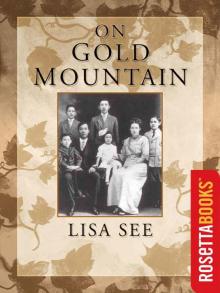 On Gold Mountain: The One-Hundred-Year Odyssey of My Chinese-American Family
On Gold Mountain: The One-Hundred-Year Odyssey of My Chinese-American Family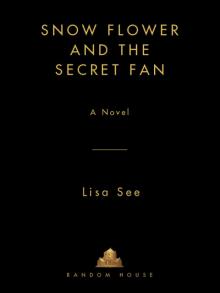 Snow Flower and the Secret Fan
Snow Flower and the Secret Fan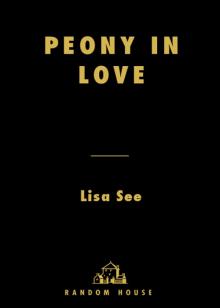 Peony in Love
Peony in Love Flower Net
Flower Net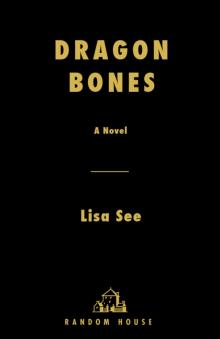 Dragon Bones
Dragon Bones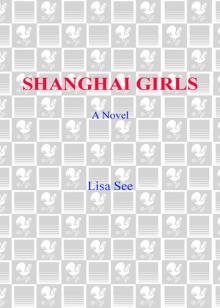 Shanghai Girls
Shanghai Girls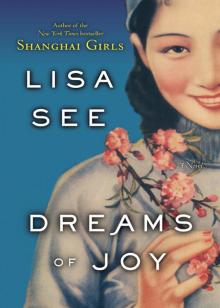 Dreams of Joy
Dreams of Joy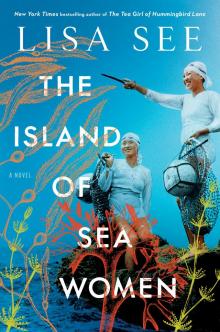 The Island of Sea Women
The Island of Sea Women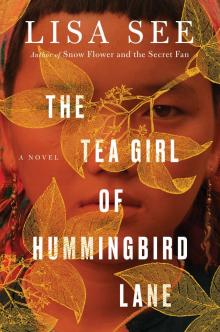 The Tea Girl of Hummingbird Lane
The Tea Girl of Hummingbird Lane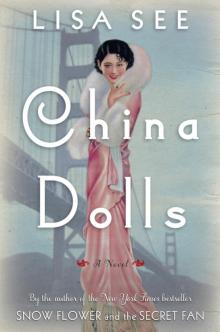 China Dolls
China Dolls The Interior
The Interior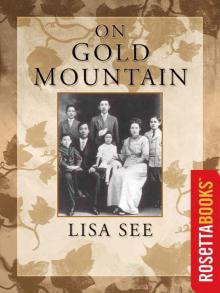 On Gold Mountain
On Gold Mountain